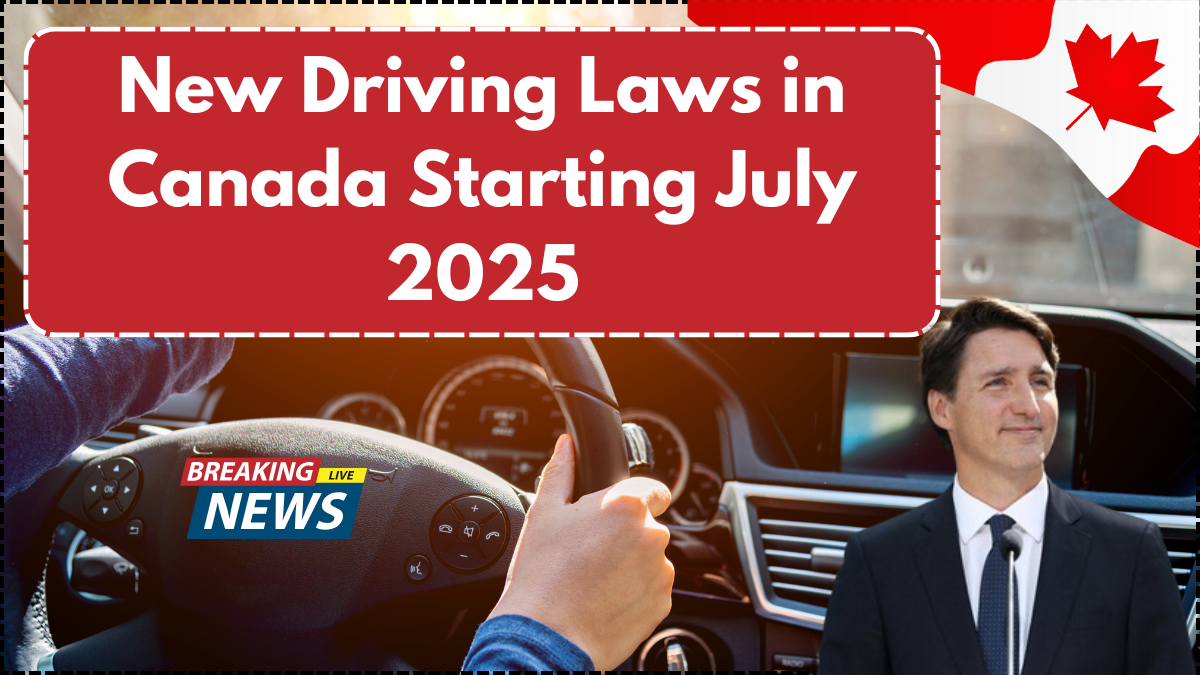Starting July 1, 2025, Canada is introducing much tougher penalties for distracted driving across all provinces and territories. This isn’t limited to texting behind the wheel — it includes any action that takes your eyes or focus off the road, such as adjusting GPS, eating, or even interacting with in-car systems.
The minimum fine has increased to $750 for a first offence, and drivers will also receive 4 demerit points. Repeat offenders face suspensions up to 30 days and fines of $2,000 or more, depending on the severity. These updates reflect growing concerns about the rise in distraction-related crashes, which accounted for over 23% of road fatalities in 2024, according to Transport Canada.

Mandatory Speed Limiting Devices for Commercial Trucks
Commercial vehicles exceeding 11,000 kg must now have speed-limiting technology installed and activated. These devices will cap the vehicle’s speed at 105 km/h, aligning with similar mandates in European countries.
The move aims to reduce high-speed collisions and improve fuel efficiency. While this rule has been in discussion for years, enforcement begins July 2025. Carriers failing to comply may face fines up to $10,000 and the possibility of license suspension.
New Graduated Licensing Rules for Novice Drivers
Provinces are tightening up Graduated Driver Licensing (GDL) systems. In Ontario and British Columbia, for example, the minimum period for holding a learner’s permit is increasing from 8 to 12 months, and novice drivers must complete a certified driver education program to proceed to the next level.
These changes are aimed at better preparing new drivers before granting full privileges. Nighttime driving restrictions and zero-tolerance for alcohol and cannabis will continue to be strictly enforced, with roadside suspensions for any violations.
Zero Emission Vehicle (ZEV) Incentives Tied to Driver Training
In an effort to encourage both green transportation and driver accountability, Canada is linking some ZEV rebates to completion of an eco-driving course starting July 2025. This applies to vehicles purchased under federal incentive programs.
Drivers who take the course can qualify for up to $7,500 in combined federal and provincial rebates, depending on the province. These courses teach techniques like smooth acceleration, regenerative braking use, and trip planning to reduce emissions. It’s part of a broader push to align sustainability with road safety.
Updated: Key Driving Law Changes Effective July 2025
Law Change | Applies To | Key Details | Penalties/Requirements |
|---|---|---|---|
Distracted Driving Fines | All Drivers | Includes phone use, eating, GPS interaction | $750+ fine, 4 points, license suspensions |
Speed Limiters on Trucks | Commercial vehicles over 11,000 kg | Mandatory activation, speed capped at 105 km/h | Fines up to $10,000 |
Graduated Licensing Extension | Novice drivers | Learner’s stage increased to 12 months, mandatory training | New timeline for full license eligibility |
ZEV Incentive Conditions | New EV buyers | Eco-driving course required for full rebates | Up to $7,500 in incentives |
Impaired Driving Thresholds Expanded | All Drivers | Includes THC impairment, stricter blood-test thresholds | Immediate 3-day suspension, fines, criminal charges |
What These Changes Mean for Canadian Drivers
These updates signal a clear message: road safety and environmental accountability are top priorities for Canadian regulators. While some drivers may see the new laws as restrictive, they’re designed to create long-term benefits like reduced accident rates, lower emissions, and a more responsible driving culture.
Lawmakers are also aiming for consistency between provinces. Although enforcement remains a provincial responsibility, many of these changes are expected to be uniformly adopted by mid-2026, ensuring nationwide standards.
Conclusion
Canada’s driving laws are undergoing a significant transformation as of July 2025. From tighter rules on distracted driving to new licensing requirements and incentives tied to eco-driving, these updates reflect modern challenges — and modern solutions. Whether you’re a novice driver, a commercial operator, or just looking to take advantage of ZEV rebates, staying informed is essential to staying legal — and safe — on the road.
FAQ
What are the penalties for distracted driving starting July 2025?
Penalties include a minimum $750 fine, 4 demerit points, and possible license suspension for repeat violations.
Do these new laws apply to all provinces?
Yes, though each province may implement them at slightly different paces. The goal is consistent national enforcement by mid-2026.
Is the eco-driving course mandatory for all electric vehicle buyers?
Only those seeking full federal and provincial ZEV incentives must complete the course, beginning in July 2025.
What qualifies as distracted driving under the new law?
Any activity diverting attention from driving — including phone use, adjusting music, eating, or interacting with vehicle screens.
Click here to know more.